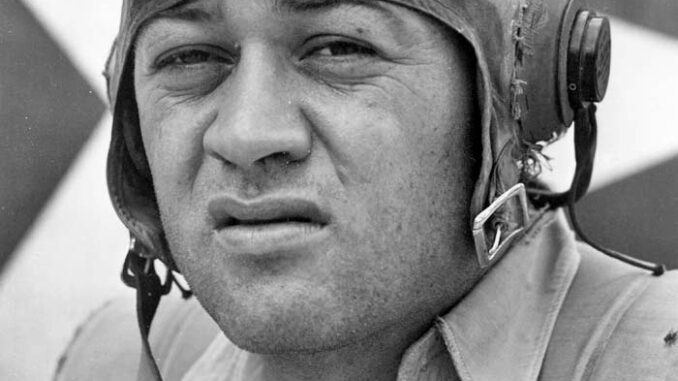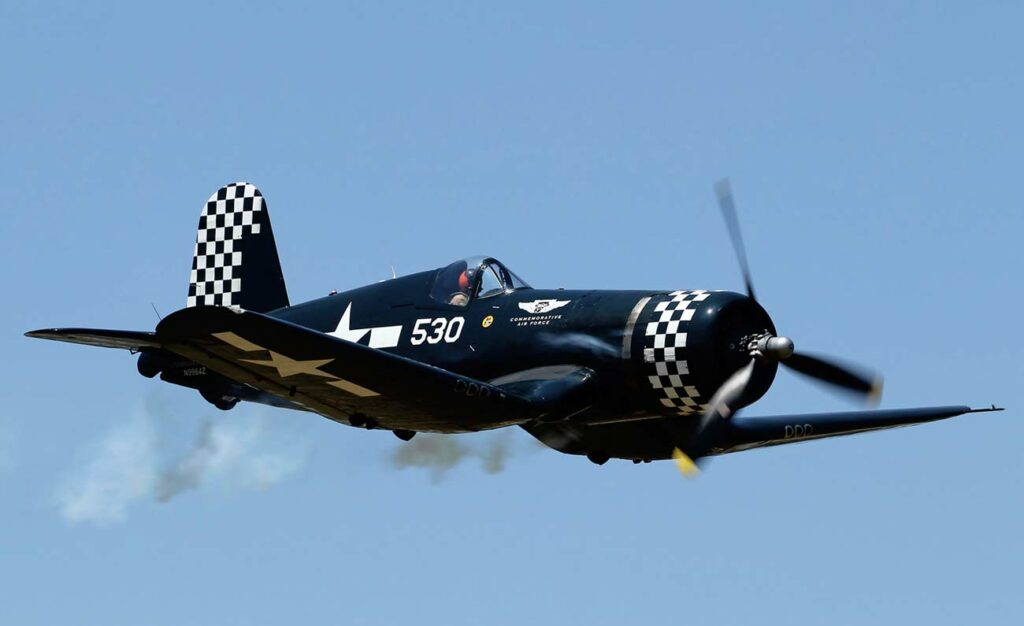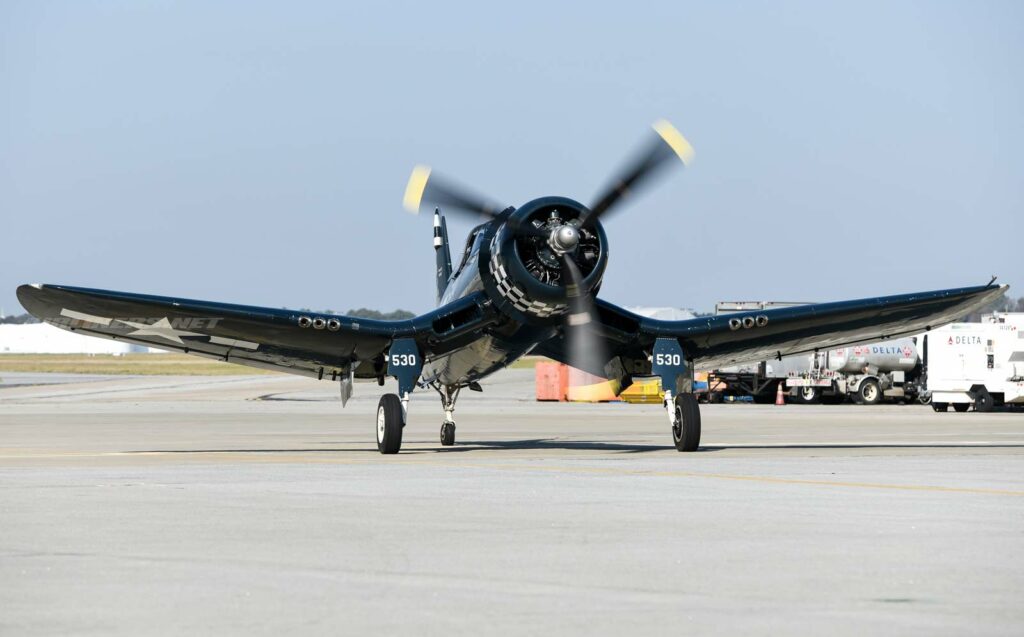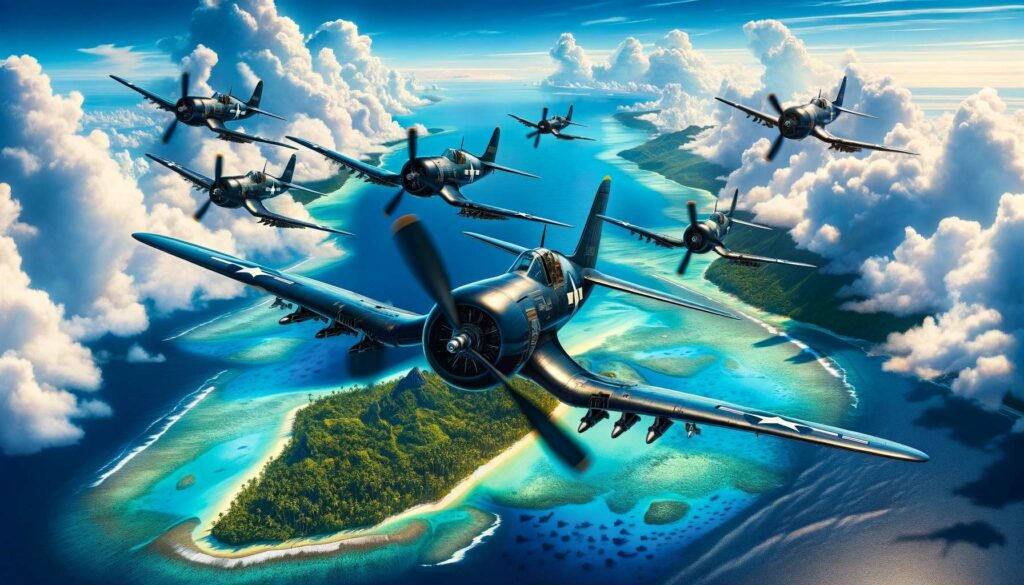
Gregory “Pappy” Boyington and his “Black Sheep Squadron” stand as towering figures in the history of aerial combat during the Pacific War in World War II. His story is one of courage, leadership, and the unbreakable spirit of a group of pilots who became legends in their time.
Gregory Boyington, known affectionately as “Pappy” due to his older age compared to other pilots, was born in Coeur d’Alene, Idaho, in 1912. He grew up with a passion for flying, leading him to serve as a Marine Corps aviator. However, it was during World War II that Boyington’s story took a turn from an ordinary military career to the stuff of legend.

In the early stages of the Pacific War, Boyington became increasingly frustrated with the lack of combat flying opportunities. This led him to resign from the Marine Corps in 1941 and join the famous “Flying Tigers,” the American Volunteer Group fighting in China against the Japanese. His time with the Flying Tigers honed his aerial combat skills, making him a formidable fighter pilot.
In 1943, Boyington returned to the Marine Corps and soon took command of a group of Marine fighter pilots. This group, initially a mix of replacement pilots with varying degrees of experience and skill, would soon transform under his leadership into the renowned VMF-214, better known as the “Black Sheep Squadron.” The squadron was stationed in the Solomon Islands, a hotbed of aerial combat in the Pacific.

Under Boyington’s leadership, the Black Sheep Squadron quickly distinguished itself through its aggressive tactics and the remarkable flying skills of its members. Boyington was a tough, sometimes unorthodox leader, but he was also deeply respected and admired by his pilots. His tactics and leadership turned the Black Sheep into one of the most effective fighter squadrons in the Pacific Theater. The squadron’s primary aircraft, the Vought F4U Corsair, became a symbol of their prowess and success.
Boyington’s personal record was impressive. He was credited with shooting down 26 enemy aircraft, tying him with the Marine Corps’ World War I ace, Eddie Rickenbacker. This achievement made him one of the top American flying aces of the Pacific War. His aggressive tactics and flying skills were legendary, earning him the Medal of Honor and the Navy Cross.
However, Boyington’s combat career came to an abrupt halt on January 3, 1944, when he was shot down over Rabaul and taken prisoner by the Japanese. He spent the next 20 months as a prisoner of war, enduring harsh conditions and uncertainty about his fate. His eventual return to the United States after the war was a cause for national celebration.

The legacy of Gregory “Pappy” Boyington and his Black Sheep Squadron lives on as a testament to their bravery, skill, and dedication. The Black Sheep Squadron’s exploits became widely known through Boyington’s memoir “Baa Baa Black Sheep,” and later, a 1970s television show of the same name, which introduced their story to a new generation. The squadron’s record during its two combat tours speaks volumes: they flew more than 200 missions and accounted for destroying a confirmed 94 Japanese aircraft and damaging another 35.
Boyington’s story is not just one of individual heroism but also of leadership and the human spirit. He was a complex character, known for his hard-drinking lifestyle and rough demeanor, yet he inspired loyalty and bravery in his men. His leadership style was unique, combining a deep understanding of aerial tactics with a genuine concern for his pilots.

The Black Sheep Squadron, under Boyington’s command, exemplified the effectiveness of air power in the Pacific War. Their success was due to a combination of strategic significance, tactical innovation, and the sheer bravery of the pilots. They contributed significantly to the American war effort, providing air support for ground operations, protecting bomber squadrons, and engaging enemy aircraft in fierce dogfights.
The legacy of Gregory “Pappy” Boyington and the Black Sheep Squadron continues to inspire and captivate. They are remembered not just for their combat achievements but also for their embodiment of the Marine Corps values of honor, courage, and commitment. Their story is a vivid chapter in the broader narrative of World War II, showcasing the critical role of air power and the indomitable spirit of those who took to the skies in defense of freedom.
War Wings Daily is an independant magazine.